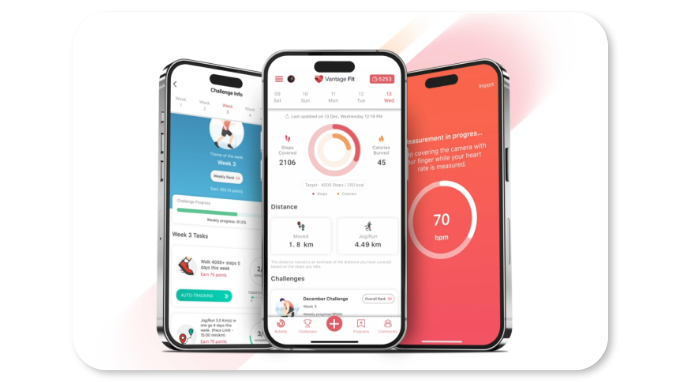Why Employee Social Wellness Matters & 5 Strategies to Improve It
While physical health programs and mental health resources are pillars of modern well-being strategies, a critical element often slips through the cracks: Social Wellness. Humans are, by nature, a hyper-social species. Our ancestors survived through cooperation, and today, our need for belonging remains just as vital—whether it stems from family, friends, or coworkers.
Yet the rise of remote work and fragmented schedules has reshaped how we connect. Employees scattered across screens and time zones report feeling disconnected, with 60% of hybrid workers admitting they struggle to build meaningful workplace relationships (Gallup, 2023).
This isn't just a "soft" issue—loneliness costs employers billions in lost productivity and innovation.
The question isn't whether social wellness matters but how to cultivate it in a world where "office culture" might mean a Slack channel. Can employers foster genuine connections that go deeper than virtual happy hours?
And do these bonds translate to measurable business outcomes?
In this article, we'll explore why social wellness is the invisible backbone of engagement, how to nurture it in dispersed teams, and practical ways to measure its impact—because building a thriving workforce starts with bridging the gap between colleagues and community.
What is Social Wellness?

Social Wellness refers to forming meaningful relationships, interacting positively with others, and engaging in a supportive social network. It is basically all about having good relationships and a strong support system.
It involves effective communication, empathy, and maintaining strong, healthy relationships, which contribute to mental and emotional well-being.
As workplaces evolve between 2025 and 2030, communication is becoming more complicated. Concerns about cancel culture and saying the wrong thing are rising, leading to strained human and professional interactions.
Social Wellness at work is the glue that turns a group of employees into a thriving community. It involves building trust, communicating openly, and feeling valued beyond job performance.
Strong interpersonal connections at work help improve communication, foster trust, and create a more supportive environment, ultimately boosting productivity and reducing stress.
Think of it as the difference between a transactional Zoom call and a team that genuinely cheers each other's wins.
In the Workplace, this translates to:
-
42% higher engagement (SHRM)
-
31% lower turnover (MIT Sloan)
-
27% faster conflict resolution (Harvard Business Review)
But most programs fail because they treat connection as an event, not a habit. Let's fix that.
Check out our blog How to Create and Implement Stress Management Programs in the Workplace?
Factors That Impact Employee Social Wellness
Before we dive into solutions, let's diagnose the root causes:
-
The Hybrid Hurdle: Remote employees miss 80% of impromptu bonding moments (Stanford).
-
Recognition Gaps: 65% of employees feel praise is reserved for "visible" roles (BambooHR).
-
Psychological Safety: 47% hesitate to share ideas, fearing judgment (McKinsey).
-
Communication Channels (e.g., Slack vs. in-person).
-
Workload Balance (time for social interaction).
Loneliness and social isolation can be as damaging to one's health as smoking 15 cigarettes a day.
Now, let's rebuild—with strategies that work for introverts, remote teams, and overloaded schedules.
Why Does Every Workplace Need to Build Social Wellness?

Social wellness flourishes when both employers and employees actively invest in meaningful connections. Here's why it is important for both employees and employers:
For Employees
-
Feel Good About Your Work: Have you ever noticed how much better you feel when you're in a positive, friendly environment? Employees who feel connected with their colleagues are not just happier but also more positive about their roles.
-
Go the Extra Mile: When you have solid relationships at work, you're more likely to be motivated to contribute your best. Think about it: Wouldn't you want to go above and beyond for a team that has your back?
-
Stress-Free Zone: We all know work can get stressful, but connecting with colleagues and participating in social wellness activities helps to reduce that stress and gives you a clearer head.
-
Build Strong Bonds: When you feel you belong, your work life becomes more fulfilling. Social Wellness helps foster that sense of belonging, making you excited to come to work every day.
For Employers
-
Create Meaningful Connections: As an employer, creating opportunities for your team to bond outside work tasks is crucial. You can make a significant difference through team-building activities and social wellness events like walkathons or outings. Why not take a walk outside or organize a fun event to let everyone connect?
-
Teamwork Makes the Dream Work: Collaboration and communication flow more easily when employees feel connected. A sense of teamwork drives productivity and sparks creativity—who doesn't want to see that in action?
-
Boost Employee Engagement: You want your employees to feel supported and valued. When they do, they'll be more engaged and motivated to contribute to the company's success. It's a win-win situation!
-
Success is a Team Effort: Employees who feel comfortable sharing ideas and working together are likelier to go above and beyond, helping the organization thrive. The best part? Everyone wins!
5 Ways to Support Social Wellness in the Workplace
It's one thing to talk about employee social wellbeing, but making it happen is what counts. If you're serious about improving it, you've got to act. Here's how both employees and employers can achieve the same -
How can Employers Support Employee Social Well-being?
If you are an HR leader or even a manager seeking innovative ways to combat hybrid work isolation and generational disconnect, then take a breath of relief. These cutting-edge approaches, along with some of the traditional methods, merge behavioral science, design thinking, and technology can help you to foster belonging -
1. Micro-recognition to Build Trust Fast

Forget annual awards. Make it your year-end goal to train managers to send 15-second praise bursts via emails or any recognition platforms after any small wins.
You can implement AI-driven tools that prompt managers to send hyper-personalized, real-time praise (e.g., "Kudos for staying calm during that client fire drill!").
Why does this work?
One of the main reasons is the instant dopamine spikes you get from quick recognition. It creates a lasting positive association. Teams using this at Cisco saw meeting participation jump 33%.
Again, a University of Michigan study found that micro-acknowledgements (15 seconds long, 2x/day) increase perceived support by 40%.
You can use Vantage Circle's recognition and reward feature to automate reminders and track praise frequency across teams.
2. Team-Building Activities
Forced "fun" alienates employees, wastes time, and makes them weary. But when done right, team-building activities can transform coworkers into collaborators.
Team-building activities are structured exercises designed to strengthen interpersonal relationships, improve communication, and foster employee collaboration.
Unlike generic "fun" events, purposeful activities focus on specific goals—whether building trust, breaking down silos, or creating space for employees to connect beyond job titles.
Why does this work?
Shared vulnerability releases oxytocin (the "trust hormone"), while collaborative problem-solving lights up the brain's reward canters.
Research demonstrates that teams with strong social connections exhibit measurable improvements in performance and retention. For example:
-
Teams with high psychological safety (a byproduct of trust-building activities) are 1.7x more innovative (Google's Project Aristotle).
-
Employees who report having a "best friend" at work are 37% less likely to leave their organization (Gallup).
-
Collaborative problem-solving activities, such as hackathons, increase cross-departmental idea-sharing by 52% (Harvard Business Review).
What you can do:
-
Start by asking your team, "Which activity would you genuinely enjoy?" and let them vote—voluntary participation boosts engagement, transforming reluctance into enthusiasm.
-
For goal-aligned solutions, consider hosting quick challenges and try to gamify them. E.g., A) Host a hackathon. B) Launch a "Failure Forum." Comment your pick (A/B) below!
-
Implement a quick 15-minute "Desk Mascot Show & Tell" (virtual or in-person) to spark connection, then conclude with a debrief question like, "How can we apply these insights in tomorrow's workflow?
Check out our blog Utilizing Gamification For Employee Fitness And Corporate Wellness
3. Biophilic "Collision Spaces"

Sterile yet mundane office spaces can become silent spaces. You might have noticed that high-traffic areas like coffee rooms or hallways often become anti-conversational zones—employees grab coffee, charge their devices, and leave without a word. Thus, these missed connection opportunities cost innovation.
However, you can fix this issue by creating a biophilic collision space. These intentionally designed zones in high-traffic areas (e.g., copy rooms, hallways, cafeterias) integrate natural elements such as living walls, water features, or nature-inspired soundscapes. These spaces aim to mimic organic environments that subconsciously encourage informal interactions.
Why does this work?
Humans have an innate affinity for nature ("biophilia"), and environments with natural elements reduce stress while fostering curiosity and openness.
Studies show that employees near biophilic design initiate 41% more spontaneous conversations (University of Oregon, 2022), which directly impacts collaboration and idea-sharing.
Add a "Nature Nook" by the coffee machine with potted plants and a sound machine playing rainforest melodies. Label herbs in shared planters with team names ("Water the Sales Team's basil!").
4. AI-Powered Compatibility Matching
What if you could see the hidden connections within your company? AI-powered compatibility matching analyzes communication, work styles, and interests to bring together unexpected pairs from different teams.
Imagine the possibilities of a coffee chat or innovation workshop between your quiet engineers and your outgoing marketers! Who would you want to meet?
Why does this work?
Ever wonder why your best ideas come from unexpected places? Homophily creates those familiar silos. However, AI can help break those. Imagine intentionally connecting diverse thinkers – like how Sama's AI-matched "innovation lunches" drove a 14% increase in projects!
And if that's not convincing enough, Forrester says cross-functional teams are a 35% innovation powerhouse! All these because diverse perspectives can help fire up your brain's problem-solving center!
Structure meetings with cross-department improvement prompts. Then, track mentorship interest after AI-powered pairings.
5. Leadership Involvement: Time to Stop Telling and Start Connecting?

What if your leader joined you in wellness practices and asked reflective questions that made you think? That's future-focused leadership! Wouldn't it be great to have a leader who shows you how to build strong connections and emotional intelligence rather than just telling you?
That's the shift we're seeing! Future leaders act as facilitators, asking the right questions and actively participating in Wellness. After all, information is everywhere. What you truly value is a leader who creates a collaborative and safe space, right?
Why does this work?
-
Teams led by curiosity-driven leaders report higher innovation rates.
-
Reflective questioning (e.g., "What's your first step?") increases employee ownership of outcomes.
-
Leaders who join wellness challenges see higher team participation in social initiatives (Gallup).
Try to end every meeting or one-on-one with reflective questions such as: "What are you taking away from this discussion?" or "What will be your first step after this?"
Check out our blog Wellness Leadership: Strategies for a Healthier, Happier Workplace
How can Employees Support their Own Social Wellbeing?
Have you ever thought about how much you can influence your own social wellbeing at work? It's not all on the management, you know! What if you used emotional intelligence and clear communication to build stronger relationships?
And what about knowing yourself better? You'd be amazed at the connections you could create!
Let's dive into some strategies you can try yourself or with your colleagues.
1. Developing Emotional Intelligence as a Foundation

Think about it: what kind of social interaction makes you feel truly good? Understanding your personal social needs is key to emotional intelligence. Stride's research shows it's not one-size-fits-all. What if you prioritize what you need?
If you are an introvert? Maybe a one-on-one is your go-to.
Again, if you are an extrovert, maybe team lunch or team activities are your sweet spot. To make it smoother, try keeping a journal—track what makes you feel alive and what leaves you flat. It's a simple way to boost your well-being.
2. Empathy in Action
What if you could instantly improve your work relationships? It starts with empathy. Empathy is more than just feeling sorry for someone; it's about understanding and sharing the feelings of another.
In a professional setting, this translates to actively listening, acknowledging, and responding to your colleagues' emotional states. It's about recognizing that everyone brings unique experiences, challenges, and perspectives to the Workplace.
How can you turn your empathy into action? Here are a few ways to do so -
-
Paraphrasing
-
Acknowledging Non-Work Challenges
-
Non-Verbal Cues
Practical tips to practice empathy
-
Active Listening: Give your full attention to the speaker, maintain eye contact, and avoid interrupting.
-
Ask Open-Ended Questions: Encourage your colleagues to share their thoughts and feelings.
-
Show Genuine Interest: Demonstrate that you care about their wellbeing.
-
Be Mindful of Your Own Biases: Recognize that your own experiences and perspectives can influence how you interpret others' emotions.
Check out our blog 12 Ways You Can Support Your Team's Mental Health as a Manager
3. Conflict Resolution Through Self-Regulation

Ever feel like you're about to say something you'll regret in a disagreement? You're not alone! Disagreements happen, but they don't have to ruin relationships. Learning to manage your emotional responses is crucial to keeping those relationships strong.
Imagine if you could reduce workplace conflicts by 22%! That's what Metro Bank employees did with the "24-Hour Rule" – waiting a day before tackling heated issues. So, how does it work? Simple:
-
When tension rises, suggest postponing the discussion.
-
Set a specific time 24 hours later to revisit the issue.
-
Use the time to reflect, write down your thoughts, and try to understand the other person's perspective.
When you reconvene, you'll likely find a more productive conversation.
4. Forming Interest-Based Pods
You might be overlooking opportunities for personal fulfilment and collaborative growth if you're not considering interest-based pods. Could you be missing out on a chance to create a more engaging and fulfilling work environment?
If yes, imagine employees organically forming micro-communities around shared passions, as recommended by LinkedIn's social wellness guide. Picture a lunchtime book club, a haven for book lovers, where weekly discussions ignite intellectual curiosity. Or visualize skill-swap groups, where knowledge flows freely between departments, fostering mutual growth.
These pods are more than just social events; they catalyze cross-departmental synergy. Deloitte's successful "Pod Squad" model, with its 28% collaboration increase, suggests that these communities can significantly enhance workplace dynamics.
Perhaps by encouraging these interest-based pods, you might foster a culture of continuous learning and collaboration.
5. Boundary Setting for Sustainable Relationships

Ever feel like your work-life balance is a bit blurry? You're not alone! Setting good boundaries is a skill, but it can seriously boost your productivity and well-being. Think of it as self-care!
By setting clear boundaries, you create a shared understanding of what's cool and what's not and set realistic expectations.
And here's the real deal: being assertive and respectful when you voice those boundaries can prevent conflict and misunderstandings, leading to a win-win for everyone.
Now, let's talk about availability. Ever feel like you're always "on"? Clearly define your working hours and response times to reduce resentment.
Try stating, "I focus on deep work from 9 AM–12 PM but am available for quick questions after lunch."
Dartmouth-Hitchcock Medical Center's "connection blueprints" led to a 37% drop in miscommunication.
It's a practical step with real results.
Perhaps, by setting these boundaries and communicating your availability preferences, you might unlock a more peaceful and productive work life.
Improve Social Wellbeing at Work with Vantage Fit's Employee Wellness Programs

Vantage Fit's platform bridges innovative social wellness strategies with measurable outcomes, offering tools to foster connection across hybrid, remote, and in-office teams. Here's how:
Vantage Fit Features That Build Camaraderie & Community
1. Step Challenges

What It Is:
Team-based competitions where employees track daily steps via wearables or apps, climbing leaderboards together.
Why It Works:
-
Friendly rivalry sparks casual conversations (e.g., "How'd you hit 15K steps?!").
-
Shared goals bridge departments—marketing vs. engineering banter turns collaboration into a game.
Over 30 DLA+ employees joined a 3-week Winter Step Challenge via Vantage Fit, collectively logging 1.49M steps (avg. 66km/employee). Participants not only burned 2,905+ calories each but also built camaraderie, with 72% adopting long-term fitness habits post-challenge.
2. Virtual Walkathons
What It Is:
Global teams "walk" virtual routes (e.g., the Great Wall of China) together, tracking cumulative progress.
Why It Works:
-
It helps to create a shared narrative ("We crossed the Great Wall of China today!").
-
Remote employees bond over photos of their virtual-world walking paths.
Check out our blog Boosting Employee Morale with a Virtual Walkathon
3. Virtual Yoga & 7-Minute Workouts

What It Is:
Live-streamed or on-demand sessions for quick, inclusive breaks (e.g., lunchtime yoga, post-meeting desk exercise sessions).
Why It Works:
-
Laughing through a funny tree pose can help humanize colleagues.
-
It helps to create a sanctuary of Wellness and bonding over something familiar.
4. Mindfulness Sessions

What It Is:
Guided group meditations or breathing exercises focused on stress relief.
Why It Works:
-
Silent moments of calm build mutual respect and vulnerability.
-
Post-session check-ins ("How are you recharging?") can help deepen connections.
5. Sweaty Selfies

What It Is:
A photo-sharing hub where employees post post-workout selfies (messy hair, red faces, gym pets welcome!).
Why It Works:
-
Relatability > perfection—seeing a VP post a sweaty post-run selfie flattens hierarchies.
-
Sparks light-hearted comments ("Who's that child photobombing?!").
Check out our blog Sweaty Selfies - Celebrating Fitness Milestones and Motivation
The Icebreaker Effect
These activities work because they:
-
Normalize Imperfection: Sweaty selfies and yoga fail to make colleagues feel approachable.
-
Create Shared Stories: "Remember when we virtually walked the Grand Canyon?" becomes team lore.
-
Require Zero Small Talk: Focus on the activity, not forced conversation.
Frequently Asked Questions

1. What are some social wellness activities for employees?
Here are some social wellness activities that are remote-friendly -Virtual Coffee Roulette: Randomly pair employees for 15-minute chats; Skill-Sharing Pods, which are like small groups teaching each other hobbies (e.g., baking, coding), etc.
Check out our blog for fun social wellness activities-20 Fun Social Wellness Activities for the Workplace
2. Examples of social wellness goals
One the best example of social wellness goal is to set up a SMART goal. It should increase cross-department mentorship pairs by xyz% in xyz months or reduce 'loneliness' scores in annual surveys by xyz%.
3. What is involved in social Wellness?
Communication, Inclusivity, Relationships, and Support Systems should be involved in social Wellness.
4. How do I get introverted employees to participate in social wellness activities?
Respect boundaries while creating options. Anonymous Praise Platforms: Let them share kudos without a spotlight. Small Groups: Pods of 3–4 for discussions vs. large events.
5. How To Measure Social Wellbeing at Work?
There are several well-known self-measurements of social wellbeing. The European Social Survey (ESS) Wellbeing Module – assesses social Wellness in terms of: feelings, functioning, health-related quality of life social functioning and support.

